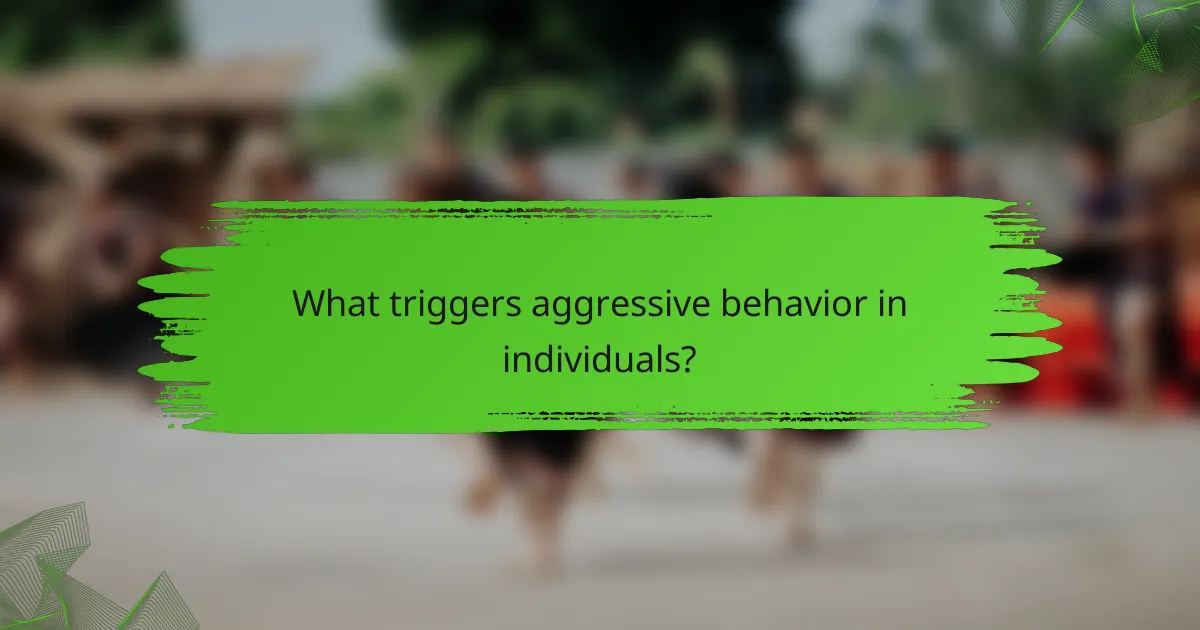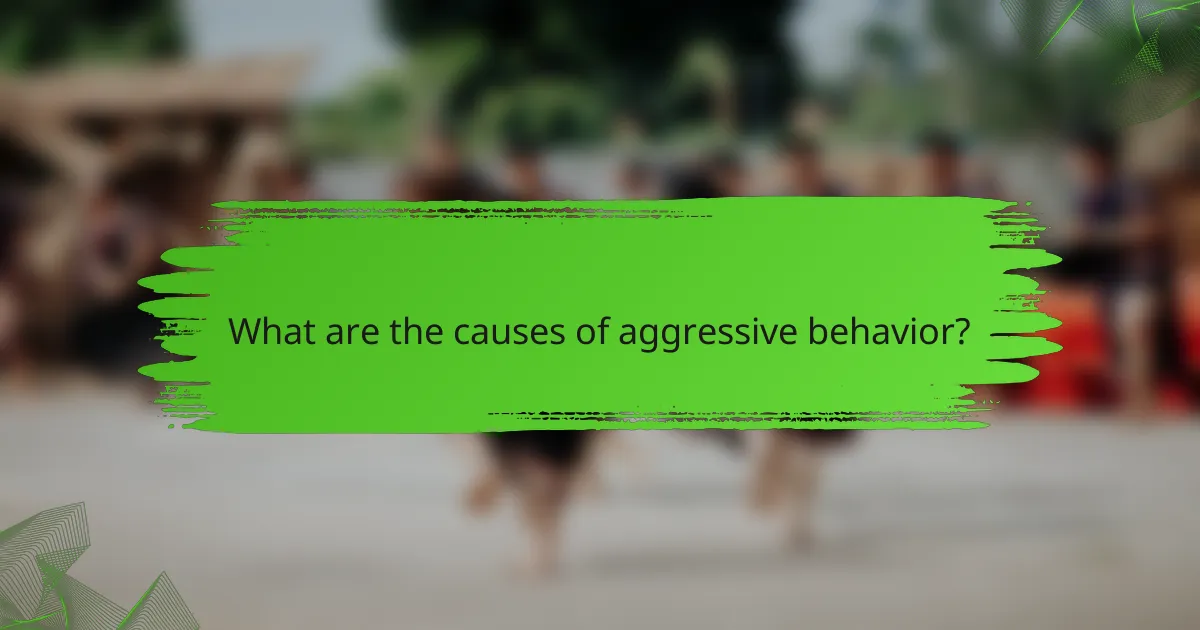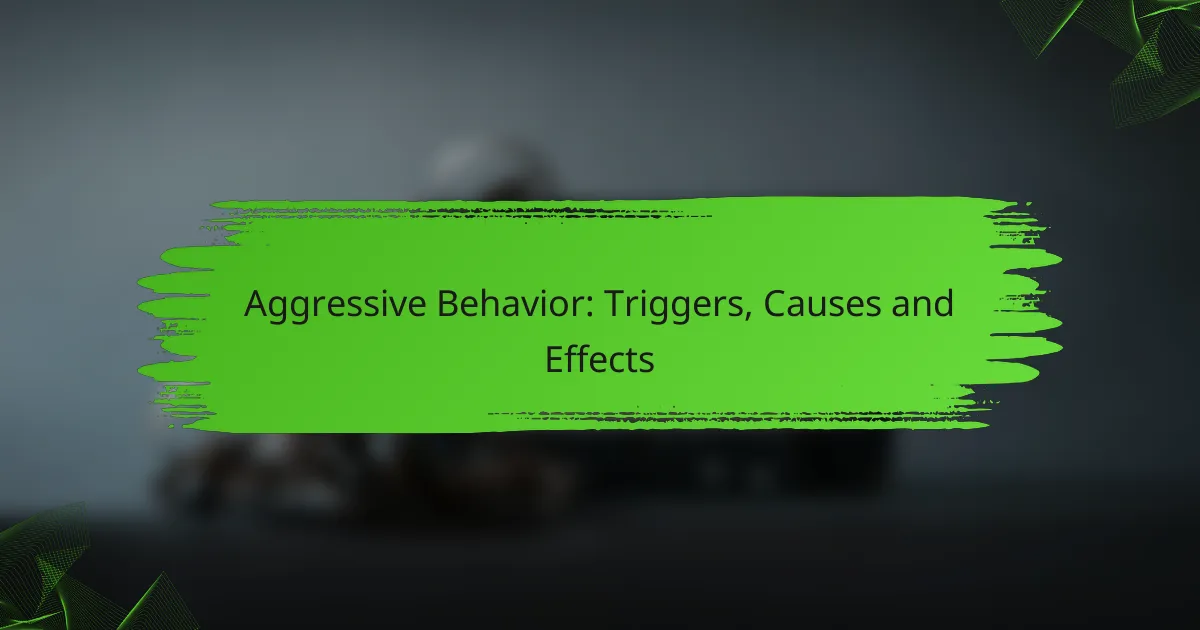Aggressive behavior is a complex phenomenon influenced by a range of triggers such as environmental stressors, substance abuse, and past trauma. It can arise from genetic, neurological, cultural, and learned factors, making it essential to understand these underlying causes. The consequences of aggression can be profound, impacting personal relationships, mental health, and social dynamics, highlighting the importance of addressing and managing these tendencies effectively.

What triggers aggressive behavior in individuals?
Aggressive behavior in individuals can be triggered by various factors, including environmental stressors, substance abuse, social isolation, frustration, and past trauma. Understanding these triggers is essential for addressing and mitigating aggressive tendencies.
Environmental stressors
Environmental stressors such as noise, overcrowding, and high temperatures can significantly contribute to aggressive behavior. These factors create discomfort and irritability, which may lead to outbursts or confrontations.
For instance, living in a densely populated area with constant noise can heighten anxiety levels, making individuals more prone to aggression. Recognizing these stressors can help in creating a more peaceful living environment.
Substance abuse
Substance abuse is a major trigger for aggressive behavior, as drugs and alcohol can impair judgment and increase impulsivity. Individuals under the influence may act in ways they normally wouldn’t, leading to violent or aggressive actions.
A common scenario involves alcohol consumption, which can lower inhibitions and escalate conflicts. Seeking help for substance abuse can reduce the risk of aggression and improve overall behavior.
Social isolation
Social isolation can lead to feelings of loneliness and frustration, which may manifest as aggression. Individuals who lack social support are more likely to experience emotional distress, making them susceptible to aggressive outbursts.
Engaging in community activities or building social connections can help mitigate feelings of isolation. Encouraging social interactions can foster a sense of belonging and reduce aggressive tendencies.
Frustration and anger
Frustration and anger are direct precursors to aggressive behavior. When individuals feel blocked from achieving their goals or encounter repeated failures, they may express their emotions through aggression.
Practicing stress management techniques, such as deep breathing or mindfulness, can help individuals cope with frustration in healthier ways. Recognizing triggers for anger can also aid in preventing aggressive responses.
Past trauma
Past trauma can have lasting effects on behavior, often leading to aggressive responses as a defense mechanism. Individuals who have experienced abuse or violence may react aggressively when they perceive threats, even in non-threatening situations.
Therapeutic interventions, such as counseling or support groups, can assist individuals in processing their trauma. Addressing these underlying issues is crucial for reducing aggressive behavior and promoting emotional healing.

What are the causes of aggressive behavior?
Aggressive behavior can stem from various causes, including genetic, neurological, cultural, and learned influences. Understanding these factors can help in addressing and managing aggressive tendencies effectively.
Genetic predisposition
Genetic predisposition refers to the inherited traits that may make an individual more prone to aggressive behavior. Research suggests that certain genes can influence temperament and emotional regulation, potentially leading to increased aggression in some individuals.
For instance, variations in the MAOA gene, often referred to as the “warrior gene,” have been linked to higher aggression levels. However, genetics alone do not determine behavior; they interact with environmental factors.
Neurological factors
Neurological factors play a significant role in aggressive behavior, particularly in how the brain processes emotions and impulses. Areas such as the amygdala and prefrontal cortex are crucial in regulating aggression and impulse control.
Imbalances in neurotransmitters, like serotonin and dopamine, can also contribute to aggressive tendencies. For example, low serotonin levels are often associated with increased irritability and aggression, highlighting the importance of brain chemistry in behavior.
Cultural influences
Cultural influences shape how aggression is expressed and perceived in different societies. Norms and values regarding conflict resolution can either promote or discourage aggressive behavior.
In some cultures, assertiveness may be valued, leading to more overt expressions of aggression, while others may prioritize harmony and non-violence. Understanding these cultural contexts is essential for addressing aggression in a way that respects local values.
Learned behavior
Learned behavior refers to aggression that is acquired through observation and experience. Individuals, especially children, may imitate aggressive actions seen in family members, peers, or media.
For example, exposure to violent video games or movies can normalize aggressive responses, making them more likely to be adopted in real-life situations. Positive reinforcement of aggressive behavior can further entrench these patterns, emphasizing the need for mindful modeling of behavior.

What are the effects of aggressive behavior?
Aggressive behavior can lead to significant negative consequences across various aspects of life, including personal relationships, legal standing, mental health, and workplace dynamics. Understanding these effects is crucial for addressing and mitigating aggressive tendencies.
Impact on relationships
Aggressive behavior often damages personal relationships by creating an atmosphere of fear and mistrust. Friends and family may feel unsafe or uncomfortable, leading to isolation and conflict.
For example, frequent outbursts can cause partners to withdraw emotionally, resulting in a breakdown of communication. Over time, this can lead to the end of relationships, as individuals seek healthier environments.
Legal consequences
Engaging in aggressive behavior can result in serious legal repercussions, including criminal charges or civil lawsuits. Acts of violence or threats can lead to arrest, fines, or even imprisonment, depending on the severity of the actions.
In many jurisdictions, aggressive behavior may also result in restraining orders, which can further complicate personal and professional interactions. Understanding local laws is essential to avoid these consequences.
Mental health issues
Aggressive behavior is often linked to underlying mental health issues, such as anxiety, depression, or personality disorders. These conditions can exacerbate aggressive tendencies, creating a cycle that is difficult to break.
Individuals exhibiting aggression may benefit from therapy or counseling to address these mental health challenges. Early intervention can help in managing emotions and developing healthier coping strategies.
Workplace dynamics
Aggressive behavior in the workplace can lead to a toxic environment, affecting team morale and productivity. Colleagues may feel threatened or demotivated, which can hinder collaboration and innovation.
Employers should implement clear policies regarding workplace behavior and provide training on conflict resolution. Addressing aggression promptly can help maintain a positive and productive work atmosphere.

How can aggressive behavior be managed?
Aggressive behavior can be managed through various therapeutic approaches and techniques that focus on understanding triggers and developing coping strategies. Effective management often involves a combination of cognitive-behavioral therapy, anger management programs, mindfulness techniques, and support groups.
Cognitive-behavioral therapy
Cognitive-behavioral therapy (CBT) is a structured approach that helps individuals identify and change negative thought patterns contributing to aggressive behavior. By recognizing these patterns, individuals can learn to respond to triggers in healthier ways.
CBT typically involves regular sessions with a trained therapist, where individuals practice skills such as problem-solving and emotional regulation. This therapy can be particularly effective for those who struggle with impulsivity and emotional outbursts.
Anger management programs
Anger management programs provide individuals with tools to control their anger and reduce aggressive responses. These programs often include educational components about the nature of anger and its effects on behavior and relationships.
Participants learn techniques such as relaxation exercises, communication skills, and conflict resolution strategies. Many programs are available in community settings and may be covered by health insurance, making them accessible for those seeking help.
Mindfulness techniques
Mindfulness techniques involve practices that promote awareness of the present moment, helping individuals recognize their feelings before they escalate into aggression. Techniques such as deep breathing, meditation, and yoga can be effective in reducing stress and enhancing emotional control.
Incorporating mindfulness into daily routines can lead to long-term changes in behavior. For example, setting aside just a few minutes each day for mindfulness practice can significantly improve emotional regulation over time.
Support groups
Support groups provide a safe space for individuals to share their experiences and learn from others facing similar challenges with aggression. These groups often foster a sense of community and accountability, which can be beneficial in managing behavior.
Participants can exchange coping strategies and receive encouragement from peers. Many support groups are facilitated by professionals and may focus on specific issues, such as anger management or emotional regulation, enhancing their effectiveness.

What role does environment play in aggressive behavior?
The environment significantly influences aggressive behavior by shaping individual responses to various stimuli. Factors such as social interactions, cultural norms, and physical surroundings can either exacerbate or mitigate aggressive tendencies.
Social Environment
The social environment includes relationships with family, friends, and peers, which can strongly impact aggression levels. For instance, exposure to violent behavior in family settings or peer groups can normalize aggression, leading to increased likelihood of similar actions.
Conversely, supportive social networks can promote positive behaviors and reduce aggression. Engaging in community activities or having strong family ties can help individuals develop healthier coping mechanisms.
Cultural Influences
Cultural norms play a crucial role in defining acceptable behaviors, including aggression. In some cultures, assertiveness may be encouraged, while in others, it may be viewed negatively. Understanding these cultural contexts is essential for addressing aggressive behavior effectively.
For example, societies that prioritize individualism may exhibit higher levels of competition and aggression, whereas collectivist cultures might emphasize harmony and conflict avoidance. Recognizing these differences can aid in developing tailored interventions.
Physical Environment
The physical environment, including urban settings, noise levels, and crowding, can trigger aggressive behavior. High-density living conditions or exposure to constant noise can lead to increased stress and frustration, which may manifest as aggression.
Creating calming environments, such as green spaces or quiet areas, can help reduce aggression. Simple changes like improving lighting and reducing noise pollution can have a positive impact on community behavior.



